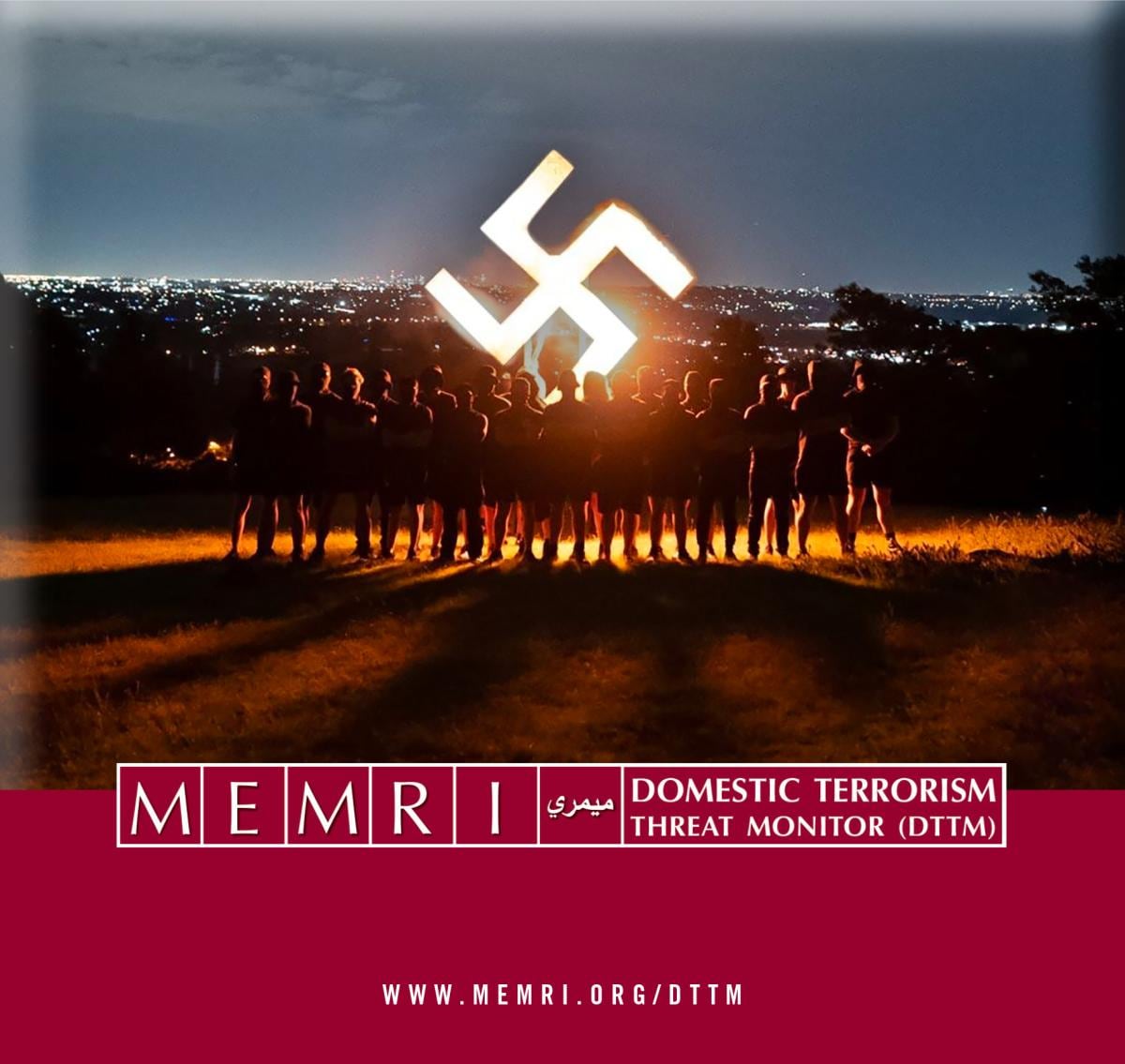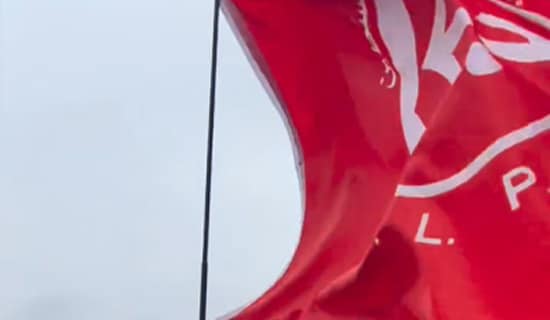Introduction
This document discusses the rising antisemitic threat throughout the West. It will provide details about this threat and critically analyze the West's ineffective response to it. Part II of this article will propose an effective plan of action against this phenomenon.

The Recent Rise Of Violent Antisemitism In The West
In recent years, there has been a sharp increase in antisemitism throughout the West.
A review of the FBI's annual national hate crimes reports produced from 1995-2021 consistently demonstrates that Jews have been the most targeted religious minority in the United States.[1] Most recently, the FBI reported a 20% increase in antisemitic hate crimes in 2021 relative to 2020.[2] In November 2022, FBI Director Christopher Wray said that 63% of religious hate crimes are motivated by antisemitism, despite the fact that Jews only comprise less than 3% of the U.S. population.[3] The New York Police Department's current statistics indicates that there is an antisemitic hate crime in the city every 36 hours, with many unreported attacks.[4]
The Anti-Defamation League (ADL) reported 3,697 antisemitic incidents including assault, harassment, and vandalism in 2022, a 36% increase relative to 2021. ADL characterized the 2022 level of incidents as the "highest number on record" since it first began its yearly Audit of Antisemitic Incidents in 1979.[5]
With regard to Europe, antisemitic incidents increased by 75% in France, 78% in the United Kingdom, and 29% in Germany in 2021 compared to 2020.[6]
Taking Germany as an example, according to the German NGO Rias there were over 2400 antisemitic incidents both in 2022 and in 2021, and a rise in violent antisemitic incidents in 2022 relative to 2021.[7] Neo-Nazi activity has been on the rise, and neo-Nazi groups such as III.Weg, Neue Stärke, and Die Heimat – all of which are still legal in Germany – are flourishing unhindered. These groups celebrate events such as the "Commemoration of Heroes", which honors and glorifies German soldiers who fell in WWII as martyrs. In addition, neo-Nazi propaganda materials such as books, music, merchandise, and apparel are widely available in Germany on online stores. (For more information about neo-Nazi activity in Germany, see Appendix.)
Israel And Antisemitism Against Diaspora Jews
It is a fact that whenever violence erupts between the Palestinians and Israel, there is a spike in antisemitic activity against Jewish communities in the West, even though those communities have nothing to do with these events.
By outward appearance, it would seem that antisemitism is a result of events in Israel. However, antisemitism long precedes the establishment of the State of Israel,[8] and today, events in Israel serve in many cases only as a pretext for antisemitism against Jews throughout the world.
For instance, the most extreme cases of antisemitism in the U.S. were not motivated by issues relating to Israel and its actions:
-
The neoNazi protestors at Charlottesville chanted "Jews will not replace us!" – they were not talking about Israel or Israelis.
-
Robert Bowers, who carried out the massacre at the Tree of Life synagogue in Pittsburgh in 2018 (which was the most lethal antisemitic attack in U.S. history), carried out the attack on the basis of his belief that the Hebrew Immigrant Aid Society (HIAS), an American Jewish organization established in 1881, was working to replace whites with Latin American immigrants.
-
Poway synagogue shooter John Earnest was motivated, among other things, by the Simon of Trent blood libel of the 15th century, and was similarly not concerned with Israel.
To further illustrate the point, since 2003 over 12 Jews have been killed for reasons unrelated to Israel, including a 65-year-old doctor named Sarah Halimi, an 85-year-old Holocaust survivor named Mireille Knoll, and an 89-year-old man named Rene Hadjadj. (For more details, including about other murders of Jews in France, see MEMRI Daily Brief No. 391).
Needless to say, there are countless of violent antisemitic incidents throughout the West that were similarly unrelated to Israel.
In modern history, two solutions to antisemitism arose among Jews: the first was to assimilate, and the second – Zionism – was to establish a Jewish state and bring to it all the Jews from the diaspora, thus transforming the Jews into a nation among the nations and ending antisemitism.
However, the establishment of a Jewish state after 2000 years of exile, rather than eliminating antisemitism, had the opposite effect of causing a rise in Jew-hatred over the years. In addition, Jew-hatred in the diaspora did not discriminate between assimilated and unassimilated Jews, as evidenced by its tragic peak – the Holocaust (which itself took place before the establishment of the State of Israel).
Hence, both Zionism and assimilation appear to have failed as solutions to pervasive antisemitism.
Ironically, Jews in both Israel and the diaspora appear to also believe that antisemitism emanates from current events in Israel. They are so absorbed in the criticism against Israel that they fail to recognize the true origin and nature of antisemitism throughout history.
The Western Response – Managing Antisemitism Instead Of Fighting Antisemites
Both the EU and the White House have found it necessary to devise comprehensive strategies for countering antisemitism. However, these strategies are aimed more at fighting the idea of antisemitism rather than directly fighting the guilty parties – antisemites and their enablers.
The European Commission's EU Strategy On Combating Antisemitism
The European response, as presented in late 2021 by the European Commission's office responsible for combating antisemitism, consists of the following components:
-
Appointing envoys for combating antisemitism in EU countries.[9]
-
Holding conferences on the subject.
-
Issuing various calls to action.
-
Fostering "Jewish life" and addressing peripheral issues such as kosher food and Jewish holidays.
SUPPORT OUR WORK

-
Increased education and awareness about antisemitism.
-
Statements about the need to strengthen the fight against online antisemitism, with no plan of action or public activity.
Unfortunately, these statements and calls to actions are empty, as evidenced by the fact that for years, very little concrete action has been taken against antisemitic groups and activities in Europe.
How is "fostering Jewish life" part of countering antisemitism? This is only possible if one accepts the premise that European society is innately antisemitic.
For example, the EU's office for combating antisemitism celebrated the Jewish holiday of Tu B'shvat, which is the beginning of the Jewish agricultural year, apparently to demonstrate that Jews care for the environment. This is clearly an effort to refute the antisemitic notion that Jews are different from non-Jews.
In a second and more distasteful example, the German Federal Government recently funded a project by a Jewish organization in Berlin to "reduce prejudices, impart knowledge about Jewish life, and create space for an open dialogue in German society." The project centers around a website where users can ask questions about Judaism, and the example questions, which are artfully stylized and visible on the website, include: "Can sex be kosher?", "Is there a Jewish Tinder?", "Is Harry Potter Jewish?", "Does the Torah come in paperback?", and "Is matzah a Jewish boy's name?"[10]

The example questions in the Federal Government-funded project to "reduce prejudices" against Jews.
This project lies on the assumption that German Jews are inherently not part of the German social fabric, and that a "dialogue" with them is needed. In addition, the example questions call attention to Jewish religious and cultural practices in a way that portrays Jews as different from non-Jews, which only reinforces anti-Jewish stereotypes.
It is clear that this paternalistic (or worse) approach is motivated by good intentions. However, such projects do not address the problem of antisemitic activity in Europe – instead of dealing with antisemites and outlawing neo-Nazi groups,[11] these strategies busy themselves with the Jews, in an attempt to convince non-Jews that Jews are ordinary people and part of the European social fabric.
Meanwhile, as noted above (and in the Appendix), neo-Nazi groups and antisemitic organizations are flourishing throughout Europe.
The Europeans' ostensibly positive approach has the unfortunate effect of distracting people from the real problem, of inadvertently covering up the activities of neo-Nazis and antisemites, and of thereby enabling these activities to continue without being appropriately addressed by the authorities.
Jews do not need Germans (or anyone else) to "foster Jewish life", particularly when this is a substitute for confronting antisemites and their enablers. Rather, Jews just need their lives to be protected and for governments to fight neo-Nazis and antisemites, rather than antisemitism as a general concept. As for Jewish life, it is the Jews' private business.
Indeed, the responsibility for fighting antisemites rests on the shoulders of the law enforcement community, but it is nonetheless absurd that the EU's administrative office for combatting antisemitism fails to properly address the subject, since publicly doing so is a vital precursor to taking law enforcement measures against antisemitic groups.
The U.S. National Strategy To Counter Antisemitism
The U.S. National Strategy to Counter Antisemitism from May 2023, which is discussed at greater length in MEMRI Daily Brief No. 488, is also aimed at managing antisemitism rather than fighting antisemitic organizations, hate groups, and online incitement against Jews.
The strategy includes several instances of placing Islamophobia on par with antisemitism, and even though hatred of Muslims is a real phenomenon in the United States, the two are not comparable because there are more antisemitic hate crimes than there are for any other hateful ideology in America. Moreover, many Muslim clerics in America themselves preach antisemitism and call for violence against Jews, and by juxtaposing antisemitism and Islamophobia, the Strategy mistakenly puts the victim and the victimizer together (see MEMRI's Imams in the West project).
Notably, the fact sheet published by the Biden administration about the Strategy even mentions "commitments to counter antisemitism and build cross-community solidarity" by the Council on American-Islamic Relations (CAIR), with the goal of educating religious communities about protecting themselves from hate incidents.[12] CAIR's inclusion in this effort is incongruous with the goals of the Strategy since many of its members are known for having made antisemitic statements and are therefore part of the problem.
Indeed, the Strategy calls for the amendment of Section 230 of the 1997 Communications Decency Act (CDA). However, considering that for over 25 years Section 230 has been enabling virtually all kinds of hateful and criminal incitement on the internet, the U.S. administration should have risen to the task and taken prompt action to amend the legislation, as recommended by the U.S. Supreme Court. But instead, like the Europeans, the administration resorted to nonbinding calls to action.
In this context, some argue that curbing people's behavior on social media and holding social media companies liable for the content on their platforms is a violation of basic free speech principles. In particular, this argument is sometimes made by the owners of these companies, who make a fortune from their platforms being unrestricted. Indeed, they would argue that their platforms have internal regulations and oversight, but the West is democratic and such matters should be regulated by elected governments – not voluntarily by profiteering corporate entities.
Section 230 does not grant traditional media outlets – print, television, radio – the same immunity enjoyed by social media companies. They are legally liable for the content they publish, yet nobody claims that this violates their free speech. Hence, this claim regarding social media companies is false.
Conclusion
Both the European and American plans of action against antisemitism are based on a mistaken premise. The main problem is that they aim at fighting antisemitism as an ideology rather than taking concrete action against antisemites, antisemitic organizations, and the platforms that enable their continued activity. This would be like fighting terrorism as a concept rather than fighting terrorists themselves.
Part II of this article will propose an effective plan of action for combatting antisemites and their enablers in the West.
Appendix – Neo-Nazi Activity In Germany
MEMRI is researching the subject of the rising antisemitic threat in the West in eight different languages, and we publish daily reports. Today, our database essentially functions as an encyclopedia on neo-Nazi and extremist violent white supremacist activity in Europe and the United States.
The following examples illustrating neo-Nazi and antisemitic activity in Germany are not even the tip of the iceberg of MEMRI's archives about antisemitic and neo-Nazi activity in the West.
The various offices, envoys, and commissioners for combatting antisemitism throughout Europe should be focused on these types of neo-Nazi and antisemitic activities rather than on doing PR for Jewish communities.
German Neo-Nazi Groups
Neo-Nazi organizations have been operating effectively unrestricted in Germany in recent years. Three prominent examples include:
-
III.Weg [13], which has become one of the most influential and active neoNazi party of recent times, with various regional branches alongside sub-groups – such as the National Revolutionary Youth, Body and Spirit, and Feder und Schwert - operating under its umbrella. Notably, III.Weg lays emphasis on recruitment among youth.
-
Neue Stärke has recently expanded branches throughout the country, and it has its own youth group. With a wide array of communitybuilding activities founded on Nazi principles, the party has gained momentum and is fast becoming a legitimate political force.
-
Die Heimat Dortmund has a large regional network and has influential members with a wide reach, such as Sascha Krolzig and Alexander Deptolla, who is the leader of the prominent MMA club Kampf der Nibelungen.
Clockwise: III.Weg, Die Heimat Dortmund, Neue Stärke
"Commemoration Of The Heroes"
Every November, German neo-Nazis assemble during the "Commemoration of the Heroes" event, which commemorates and glorifies German soldiers who fell during WWII as martyrs. This event is observed by many neo-Nazi groups, including III.Weg and Junge Nationalisten.

"Commemoration of the Heroes"
Neo-Nazi Music And Merchandise
Neo-nazi Rapper Dominik Raupbach, known as "Kavalier", recently released a single titled "Land of your Ancestors" under the neo-Nazi label company NDS. The single is available on Sportify, Apple Music, and on NDS's platform, and Kavalier raps about the need fight relentlessly for the liberation of the German fatherland as the "honorable ancestors" did.

"Land of Your Ancestors" by Kavalier
There are several German neo-Nazi merchandise platforms such as "Druck18", "PC Records", "Frontdienst", "Sturmzeichen Verlag" or "Sonnenkreuz Verlag". These platforms offer a large assortment of merchandise and apparel such as sweatshirts, mugs, flags, towels, posters, toys, equipment, key chains and other items embossed with Nazi symbols and slogans.

Iranian Antisemitic Activities In Germany
There is also anti-Jewish activity by Iran and its affiliated groups, such as the Iranian Revolutionary Guard Corps (IRGC) and Hizbullah. Iran's Islamic regime is inherently antisemitic,[14] which is why the IRGC is being employed to target synagogues and individual Jews – unrelated to Israel – in shootings and arson attacks in Germany and elsewhere. [15] In addition, according to the latest intelligence report by Germany's Federal Government, there are approximately 1,250 Hizbullah members and supporters operating in Germany.[16]
*Yigal Carmon is President of MEMRI.
[1] Federal Bureau of Investigation, Crime Data Explorer. https://cde.ucr.cjis.gov/LATEST/webapp/#/pages/home
[2] Federal Bureau of Investigation, Supplemental Hate Crimes Statistics 2021, March 2023. https://le.fbi.gov/file-repository/supplemental-hate-crime-statistics-2021.pdf/view
[3] Youtube.com/watch?v=4gKg3WMKNjs, November 17, 2022.
[4] "NYC police report 100 anti-Jewish hate crimes since start of year, down from 2022," Times of Israel, June 6, 2023, https://www.timesofisrael.com/nyc-police-report-100-anti-jewish-hate-crimes-since-start-of-year-down-from-2022/
[5] "Audit of Antisemitic Incidents 2022," Anti-Defamation League, March 23, 2023. https://www.adl.org/resources/report/audit-antisemitic-incidents-2022
[6] Antisemitism Worldwide Report 2021, the Center for the Study of Contemporary European Jewry, Tel Aviv University.
[7] Tagesschau.de/inland/gesellschaft/juden-gewalttaten-antisemitismus-100.html, June 27, 2023.
[8] Indeed, it can be traced as early as the 2300-year-old Book of Esther, in which Haman, planning the genocide of the Jews, says to the Persian king: "There is one nation dispersed among the nations [who] keep themselves separate. Their customs are different from those of others, and they do not obey the king's laws; it is not in the king's best interest to tolerate them." (Esther 3:8)
[9] Notably, some of these envoys and commissioners are included in the Wiesenthal Center's 2021 Top Ten report, including the antisemitism commissioner from the state of Baden-Württemberg Michael Blume and the commissioner from Schleswig-Holstein Gehard Ulrich. See Wiesenthal.com/assets/pdf/global_anti-semitism_2021_top_ten.pdf. See also: Juedische-allgemeine.de/politik/beauftragter-fur-antisemitismus-in-der-kritik/, and Jns.org/calls-for-german-bishops-resignation-over-antisemitism-accusations/.
[10] Elnetwork.eu/country/germany/elnet-germany-launches-a-nation-wide-campaign-against-antisemitism/, June 21, 2023.
[11] The German government is indeed working to outlaw the extremist right-wing AfD party, which is not an openly neo-Nazi party, but it is not dealing with openly neo-Nazi groups such as III.Weg, Neue Stärke, and Die Heimat Dortmund.
[12] Whitehouse.gov/briefing-room/statements-releases/2023/05/25/fact-sheet-biden-harris-administration-releases-first-ever-u-s-national-strategy-to-counter-antisemitism/, May 25, 2023.
[13] See Taking Inspiration From Hitler Youth Programs Of Nazi Germany, Modern German Neo-Nazi Groups Rekindle Nazi 'Volksgemeinschaft' Ideas
[14] See MEMRI Inquiry and Analysis No. 1514, Iranian Regime Marks Qods Day 2020 With Antisemitism, Blood Libels, And Calls For Destruction Of Israel, May 21, 2020; MEMRI Inquiry and Analysis No. 922, The Image Of The Jew In The Eyes Of Iran's Islamic Regime – Part I: Theological Roots, January 25, 2013.
[15] Washingtonpost.com/world/2023/03/06/iran-revolutionary-guard-attacks-germany/, March 6, 2023.




